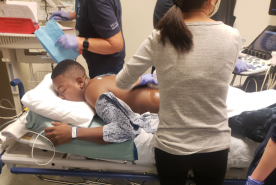Nephrotic syndrome is a kidney condition that leads to swelling and other symptoms. While it can affect people at any age, nephrotic syndrome usually occurs in children between 2 and 9 years of age.
In children with nephrotic syndrome, tiny filters in the kidneys, called glomeruli, are injured. They let too much protein leak out of the blood and into the urine. The low protein levels in the blood cause water to move from the blood and into other parts of the body, such as the face, legs, arms and abdomen (belly). This water in parts of the body is what causes the swelling, also called edema.
What are the symptoms of nephrotic syndrome?
Swelling in the legs, abdomen and around the eyes is usually the first sign of nephrotic syndrome. The eye swelling is usually worse in the morning. Sometimes there may be swelling in the genital area.
Swelling around the eyes may be confused with allergies. However, urine tests that shows large amounts of protein usually point to nephrotic syndrome.
Among other symptoms, your child may say that their urine looks "foamy." High cholesterol in the blood can also happen with nephrotic syndrome.
Are there different types of nephrotic syndrome?
Yes, there are several types of nephrotic syndrome. The most common type in children is called "minimal change disease" (MCD). The cause of MCD is not known. With minimal change disease, the kidney looks normal under the microscope (which is why it is called "minimal change") when a small piece of kidney tissue is examined.
Focal segmental glomerulosclerosis (FSGS) is the second most common cause of nephrotic syndrome in children. FSGS most often occurs in older children and adolescents. In some cases, FSGS may be caused by a genetic abnormality. Most often, though the cause is not known. A kidney biopsy must be done to make the diagnosis of FSGS.
Other rare causes of childhood nephrotic syndrome include congenital nephrotic syndrome (occurs in children less than 3 months of age) and membranoproliferative glomerulonephritis (MPGN). Nephrotic syndrome may also be due to disorders such as lupus, infection or obesity.
How is nephrotic syndrome diagnosed?
Sometimes a diagnosis is made from lab results and physical exam. Other times a kidney biopsy is needed to confirm the type of nephrotic syndrome. For a kidney biopsy, the doctor uses a needle to get a small piece of one of the kidneys while your child is sedated.
If your physician thinks your child has MCD, a kidney biopsy typically is not needed. However, if treatment does not stop protein from leaking into the urine, your kidney doctor may do a kidney biopsy. This will help show if the kidney disease is something other than minimal change disease.
Your child's doctor may also decide if a kidney biopsy is needed if:
- Test results suggest a diagnosis other than MCD.
- There are signs of poor kidney function (measured by a blood test called creatinine, which is used in a calculation to determine kidney function).
- A large amount of blood is found in the urine.
- A family history of certain kidney diseases exists.
How is nephrotic syndrome usually treated?
Corticosteroids (medicines called prednisone or prednisolone) are the main treatment for nephrotic syndrome due to minimal change disease. If protein in the urine is severe and blood albumin levels are very low, your doctor may give albumin by an intravenous (IV) injection directly into the bloodstream. In some cases, medicines called diuretics (water pills) may be needed to help the kidneys remove excess fluid.
How do children with nephrotic syndrome typically respond to treatment?
About 80% of children with minimal change disease between 2 and 9 years of age will respond to treatment within 3 to 4 weeks. This means protein in the urine and swelling will go away while taking the medication. When protein in the urine goes away completely, this is called remission.
However, many children will have relapse (return) of protein in their urine. Some children will rarely have relapses while others have frequent relapses. Relapses require another course of prednisone, possibly in addition to other medications.
Some children with nephrotic syndrome have steroid-resistant nephrotic syndrome. This means that protein in the urine does not go away with prednisone treatment. In this case, your child's doctor will consider a kidney biopsy, prescribe other medications and sometimes recommend genetic testing.
Do children with nephrotic syndrome need to follow a special diet?
A low salt (sodium) diet to help limit the swelling in the body is often recommended for children with nephrotic syndrome. This is most important when there is protein leaking into the urine. A dietitian who works with the kidney doctor can provide recommendations.
Are there complications of nephrotic syndrome?
Complications of nephrotic syndrome include infection and blood clots. Some children with nephrotic syndrome other than minimal change disease will eventually develop permanent kidney damage. When this happens, it is called chronic kidney disease. Permanent damage almost never happens in children with nephrotic syndrome that responds to prednisone.
Additional Information:
Source
American Academy of Pediatrics, American Society of Pediatric Nephrology and the National Kidney Foundation Patient Education Collaborative (Copyright © 2022)
The information contained on this Web site should not be used as a substitute for the medical care and advice of your pediatrician. There may be variations in treatment that your pediatrician may recommend based on individual facts and circumstances.

















